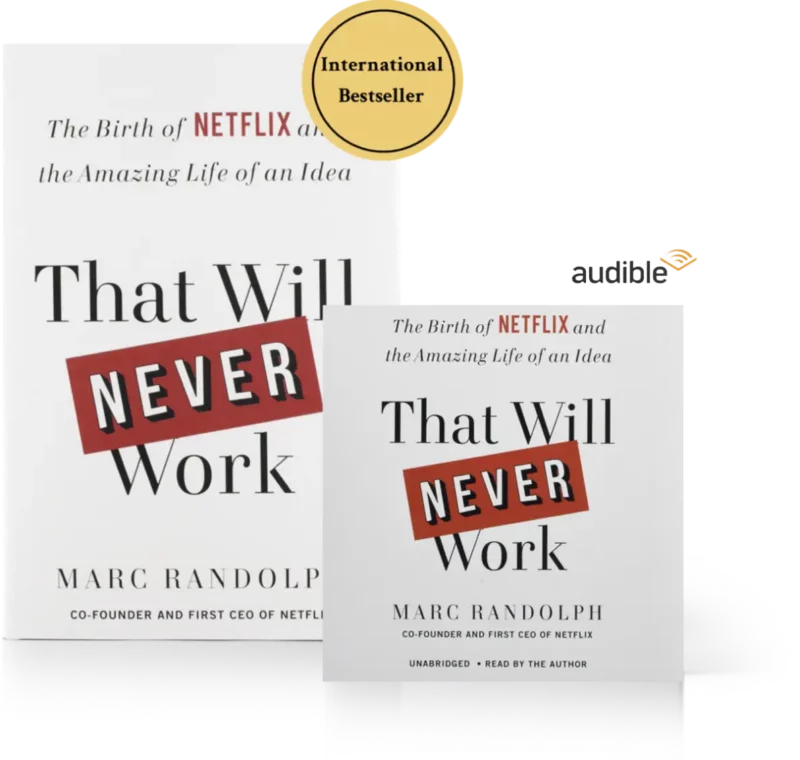Grow Up? Or Get Out?
What happens when running a company isn’t as fun as growing one?

Starting a company is a moonshot.
You know your initial idea isn’t going to work. But you hope that with the right people, a little money, a lot of persistence, enough time, and a fair amount of luck, you’ll be able to iterate from that first bad idea – the one that everyone says will never work – to the idea that does.
If it does happen, it rarely happens quickly. At Netflix it took us more than 18 months (and hundreds of failed experiments) to get to the no-due-dates no-late-fees subscription model that saved us. At Looker it took us even longer – more than 2 years – to realize who our real customer was and what they wanted.
Get to that point and it’s tempting to think your problems are over. You’ve got product-market fit and found a repeatable / scalable business model. Now just repeat and scale.
But your problems are just beginning, since although it feels like you’ve scratched and clawed your way to the top, you are on a false summit, and in front of you lies an even bigger peak.
You find out that running a business is quite different from building one. Not only are the problems wholly different as you evolve from “figuring it out” to “scaling it”, but so are the skills needed.
As your company grows it needs to evolve and so do you; new management structures, cultural challenges, different customer types, adjoining markets, and new sales channels.
It’s rare for companies to reach that place where they are no longer a startup but are, in many ways, a mature company. More often, companies run out of steam long before that point. Their total addressable market is smaller than they thought, their solution isn’t as broad as they hoped, or more often, the founders realize that running a company isn’t as fun as growing one.
It’s time to get out.
But knowing when to sell is an art, not a science. Partly it takes the realization that your product or service is not big enough to remain a standalone offering, and in fact would be better off as part of a larger company’s catalog.
It might be the realization that another company has the skills, the reach, the talent, or the just-plain-interest to keep on going with something you’re losing energy for. Your baby may be better off in somebody else’s hands.
Sometimes it’s just good personal financial planning. Sure, your investors are pushing you to go for the home run, but they have already hedged their bets. Your company is one of dozens. Their business model is based on a small percentage of those bets having a big enough return to make up for all the rest.
You on the other hand have a single stock in your portfolio. And often it is better to take a reasonable gain and walk away than risk everything in an uncertain future.
Often the bigger challenge is not figuring out “if” you should sell but “when.” Unfortunately, the best times to sell (when things are going really well!) are the times you’re least interested in doing so. Whereas when you’re most interested in getting out (when things have totally gone to shit and you’re almost out of money) is exactly the worst.
What an acquiring company wants is potential, but if that potential is obvious, it makes it particularly challenging to walk away.
If you find this an interesting paradox, you’ll enjoy the most recent episode of my That Will Never Work podcast which is out now. I speak with Robert, a biotech industry veteran, who has developed a life-saving medical device. He’s proven it works, and he can see the huge potential ahead of him but wonders if the challenges of bringing it to market might better be handled by partnering with an established pharmaceutical company. It’s a great conversation all around and one that I think will be interesting to anyone who is lucky enough to find themselves in this position.
Luckily for Robert (and every entrepreneur), the things he needs to do to make his company interesting to someone else are almost identical to the things he would be doing otherwise: make a great product, grow, hire well, become profitable.
Although it’s tempting to always be scanning for the exits, my advice is simply to keep your head down and focus on the problems in front of you. As with most good things, the best outcomes will come when you aren’t particularly looking for them.
RECOMMENDED FOR YOU
Congratulations on Landing Your First Job...
Podcast Episode 72
Is it a Culture Problem or a Hiring Problem?
October 25, 2022 • 38 min
